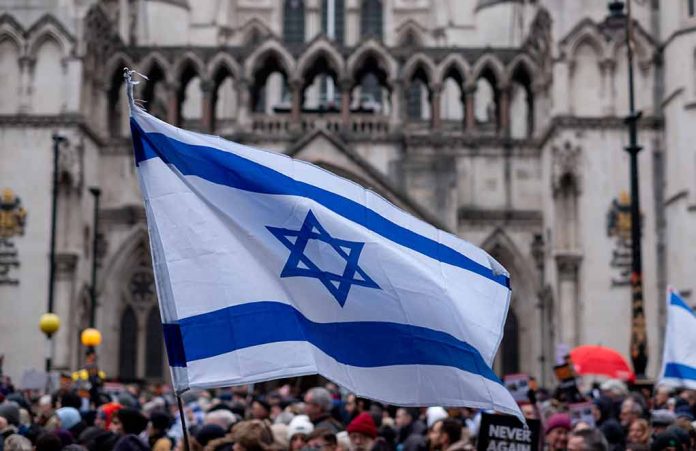
NYC mayoral candidate Zohran Mamdani refuses to recognize Israel as a Jewish state while polling second in the Democratic primary, sparking outrage and accusations of antisemitism that could derail his campaign.
Key Takeaways
- NYC mayoral candidate Zohran Mamdani, currently polling second in the Democratic primary, stated he believes in Israel’s right to exist but refused to acknowledge it as a Jewish state during a debate.
- Mamdani, a member of the Democratic Socialists of America and endorsed by Alexandria Ocasio-Cortez, has been criticized for not supporting an Assembly resolution denouncing the Holocaust.
- Jewish voters constitute approximately 16% of NYC’s primary electorate, making Mamdani’s controversial stance potentially damaging to his electoral prospects.
- Mamdani’s socialist housing policies have raised concerns about potential negative impacts on New York City’s economy.
- Early voting for the Democratic primary begins June 14, with primary day on June 24, giving voters limited time to consider the implications of Mamdani’s positions.
Controversy Over Israel Stance During Mayoral Debate
During the first Democratic mayoral debate, New York State Assemblymember Zohran Mamdani found himself under scrutiny when moderators questioned candidates about Israel’s right to exist as a Jewish state. While other candidates readily affirmed this position, Mamdani carefully crafted his response to avoid acknowledging Israel’s Jewish character. “I believe Israel has the right to exist, as a state with equal rights,” Mamdani stated, conspicuously omitting any reference to Israel’s Jewish identity despite repeated opportunities to clarify his stance.
The debate also highlighted differences in candidates’ approaches to Israel relations. When asked about their first international visit if elected mayor, frontrunner Andrew Cuomo and several others immediately mentioned Israel, while Mamdani insisted he would remain in New York. “I believe you need not travel to Israel to stand up for Jewish New Yorkers,” Mamdani said, drawing criticism from Jewish community leaders who viewed his response as dismissive of the strong connection between New York City and Israel.
Political Affiliations and Endorsements Raise Eyebrows
Critics point to Mamdani’s refusal to support an Assembly resolution denouncing the Holocaust as particularly troubling. This action, combined with his self-identification as an anti-Zionist and membership in the Democratic Socialists of America (DSA), an organization known for its hardline stance against Israel, has alarmed Jewish voters who constitute approximately 16% of the primary electorate. Joseph Potasnik of the New York Board of Rabbis has been vocal in his criticism, highlighting the contradiction in Mamdani’s claim to support Jewish New Yorkers while refusing to acknowledge the Jewish character of Israel.
“There’s been antisemitism in this city. I believe it’s a growing problem and I believe the rhetoric about Israel has actually inflamed antisemitism. Put that aside, I think this is just another overreach of the Trump administration,” said Andrew Cuomo during the debate, addressing the broader issue of rising antisemitism in New York City.
Mamdani’s consistent opposition to Israel’s war against Hamas following the October 7 terrorist attacks has further solidified concerns about his positions. His allies within the DSA have made controversial statements praising anti-Jewish actions, raising questions about whether someone with such views should lead a city with the largest Jewish population outside of Israel.
Economic Concerns and Electoral Implications
Beyond his controversial foreign policy positions, Mamdani’s domestic agenda has raised serious economic concerns for New York City. As a socialist affiliated with the DSA, his housing policies promote rent control and other market interventions that critics warn could devastate the city’s already struggling real estate market and further drive businesses and taxpayers from the city. These economic policies, combined with his stance on Israel, present a potentially toxic combination for many moderate Democratic voters who worry about both antisemitism and economic stability in the aftermath of the COVID pandemic.
“I believe Israel has the right to exist, as a state with equal rights,” said Zohran Mamdani during the debate, conspicuously omitting any recognition of Israel as a Jewish state despite repeated opportunities to clarify his position.
With early voting for the Democratic primary beginning June 14 and primary day set for June 24, voters have limited time to evaluate the full implications of Mamdani’s candidacy. Current polling shows him in second place behind former Governor Andrew Cuomo, making his controversial positions more than just academic concerns. For New York’s significant Jewish population and those concerned about the city’s economic future, Mamdani’s refusal to recognize Israel as a Jewish state and his socialist economic policies have become central issues in a race that will likely determine who leads America’s largest city for the next four years.







